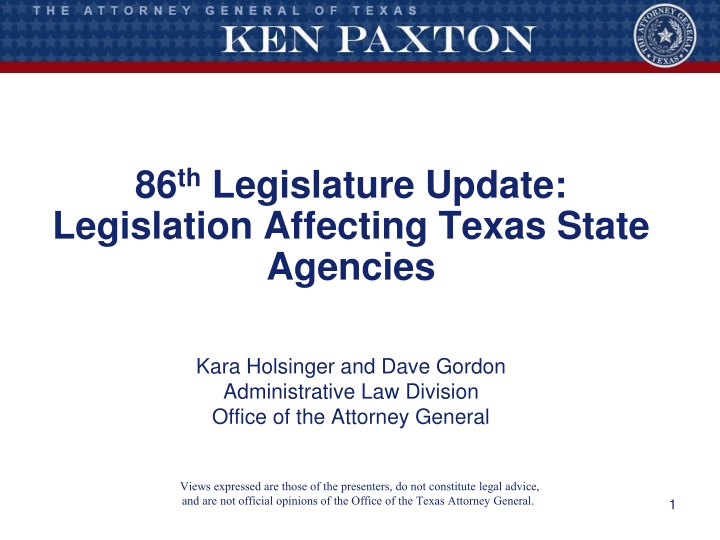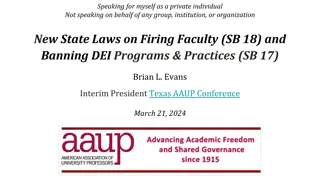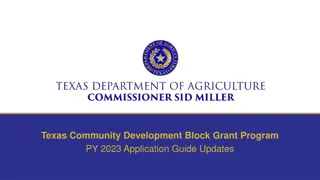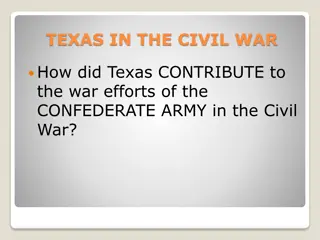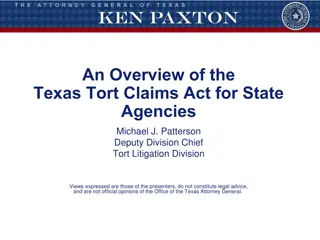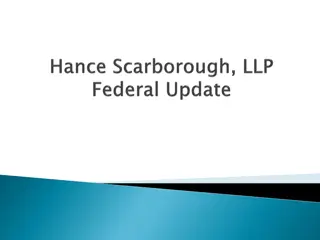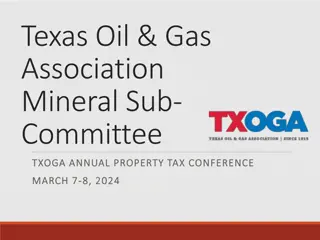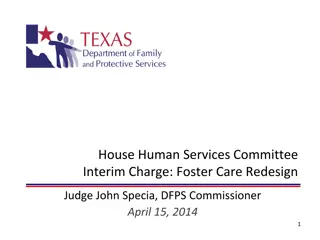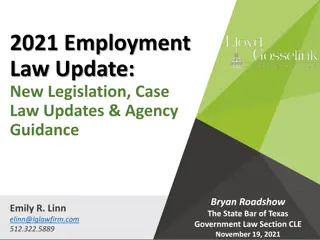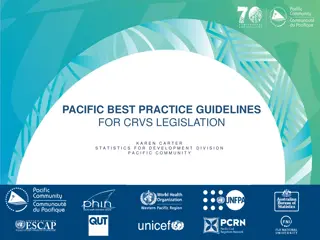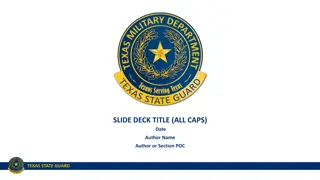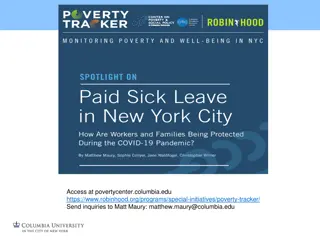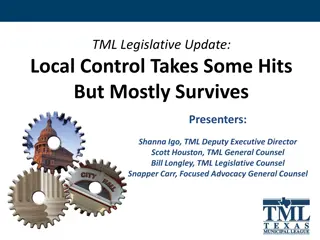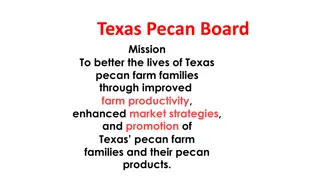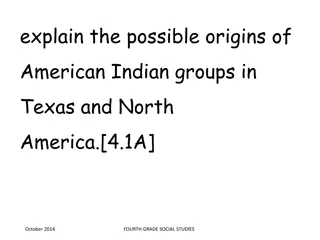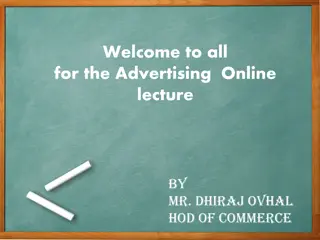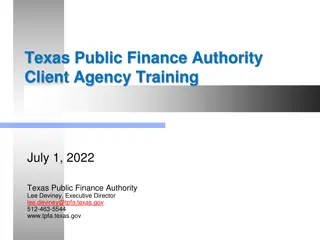Updates on Recent Legislation Impacting Texas State Agencies
Recent legislative updates affecting Texas state agencies include the Texas Open Meetings Act amendments such as SB 1640, SB 494, and HB 2840. SB 1640 restores criminal penalties for deliberations outside of posted meetings, SB 494 addresses actions during emergencies, and HB 2840 allows public address at open meetings. Additionally, SB 494 amends the Public Information Act to allow suspension during catastrophes.
Download Presentation

Please find below an Image/Link to download the presentation.
The content on the website is provided AS IS for your information and personal use only. It may not be sold, licensed, or shared on other websites without obtaining consent from the author.If you encounter any issues during the download, it is possible that the publisher has removed the file from their server.
You are allowed to download the files provided on this website for personal or commercial use, subject to the condition that they are used lawfully. All files are the property of their respective owners.
The content on the website is provided AS IS for your information and personal use only. It may not be sold, licensed, or shared on other websites without obtaining consent from the author.
E N D
Presentation Transcript
86thLegislature Update: Legislation Affecting Texas State Agencies Kara Holsinger and Dave Gordon Administrative Law Division Office of the Attorney General Views expressed are those of the presenters, do not constitute legal advice, and are not official opinions of the Office of the Texas Attorney General. 1
Open Meetings Act SB 1640 SB 1640 restores criminal penalties for deliberations among a quorum of governmental body members outside of a posted meeting. In February 2019, the Texas Court of Criminal Appeals concluded that Government Code 551.143 (commonly known as the walking quorum provision) was unconstitutionally vague. The law creates a criminal offense for knowingly engaging in at least one communication among a series of communications that each occur outside of a meeting . . . and that concern an issue within the jurisdiction of the governmental body. . . 3
Open Meetings Act SB 494 SB 494 Open Meetings Act During Emergencies Allows a governmental body to take action after posting notice of meeting for at least one hour, but the deliberation and action can only relate to the emergency identified in the notice (unless other business has already been posted). A qualifying emergency includes: an imminent threat to public health and safety; a fire, flood, earthquake, hurricane, tornado, or wind, rain, or snow storm; power failure, transportation failure, or interruption of communication facilities; epidemic; or riot, civil disturbance, enemy attack, or other actual or threatened act of lawlessness or violence. 4
Open Meetings Act HB 2840 HB 2840 requires certain governmental bodies to allow any member of the public who wishes to address the body regarding an item on the agenda for an open meeting to do so at the meeting before or during the body s consideration of that item. The amendment only applies to specific local governmental bodies, but does not apply to a board, commission, department, committee, or agency within the executive or legislative branch of state government that is directed by one or more elected or appointed members. 5
Public Information Act SB 494 Allows a governmental body to suspend the requirements of the PIA during a catastrophe by providing public notice and notice to the Office of the Attorney General. Allows for an initial suspension period of up to seven days, and one additional suspension period of up to seven days. A catastrophe means a condition or occurrence that interferes with the ability to comply with the PIA, including: a fire, flood, earthquake, hurricane, tornado, or wind, rain, or snow storm; power failure, transportation failure, or interruption of communication facilities; epidemic; or riot, civil disturbance, enemy attack, or other actual or threatened act of lawlessness or violence. 7
Public Information Act SB 494 Notice form available on Office of the Attorney General website. Website: https://www.texasattorneygeneral.gov/open- government/governmental-bodies/public-information-act- catastrophe-extension-notice-instructions The Attorney General s Open Government Hotline can also field questions about PIA suspension and catastrophe: (512) 478-6736 or toll free 1-877-673-6839 8
Public Information Act SB 943 SB 943 expands public disclosure requirements related to government contracts under the PIA and revises exceptions from disclosure based on competitive advantage and trade secrets. The legislation also creates a new exception from disclosure for proprietary information. This legislation is, in part, a response to Boeing v. Paxton, 466 S.W.3d 381 (Tex. 2015), where the Court held that private parties that contract with the state have standing to raise exceptions to PIA disclosure. The law now clarifies that only a governmental body may raise an exception to disclosure under Section 552.104 in situations where disclosure may harm the government s competitive interests. 9
Public Information Act SB 943 Imposes recordkeeping requirements on non-governmental entities for contract information related to a contract that results in the expenditure of more than $1 million. PIA requests implicating this contract information require the governmental body to notify the contracting entity within three days of the PIA request and to request the information. Defines what type of contracting information is considered expressly public, including: Terms describing the overall price that the government will pay; Description of items or services to be delivered; Delivery and service deadlines; Remedies for breach of contract; Identity of the parties and subcontractors to the contract; Executions dates, effective dates, extensions; and Information indicating whether a vendor or contractor performed its duties. 10
Public Information Act SB 943 New contract requirements for contracts that have a stated value of $1 million or result in the expenditure of at least $1 million. These contracts must require the contracting entity to: (1) preserve all contracting information related to the contract as provided by the records retention schedule applicable to the governmental body; (2) promptly provide contract information at the request of the governmental body; and (3) on completion of the contract, provide all contract information to the governmental body or preserve it in accordance with the governmental body s records retention schedule. 11
Public Information Act SB 944 SB 944 provides a process for a governmental body to retrieve public information held by a temporary custodian, specifies the procedure for making a written request, and creates an exception for certain health information. Requires that a current or former officer or employee of a governmental body who maintains public information on a private device: (1) forward the public information to the governmental body for proper preservation; or (2) preserve the public information in its original form in a backup or archive and on the privately owned device for a the time prescribed by law. 12
Public Information Act SB 944 Records custodian must make reasonable efforts to obtain public information from a temporary custodian (which could be a former employee) if: (1) the information has been requested; sufficient to warrant a belief that the temporary custodian has possession of the information; (2) the officer for public information is aware of facts duties without obtaining the information; and (3) the public information officer cannot comply with PIA the information to the public information officer. (4) the temporary custodian has not previously provided 13
Public Information Act HB 4181 HB 4181 creates a legislative privilege for certain communications concerning legislative activity, among a member or officer of either legislative chamber, the Lieutenant Governor, a member of the governing body of a legislative agency, or a legislative employee. Some legislative records would not be subject to the PIA, including: Communications relating to request for information, advice, opinion of a parliamentarian; Communications between legislative offices and staff of the Texas Legislative Council; and Legislation drafting records A governmental body can withhold records without asking the Attorney General for a decision. 14
Public Information Act HB 81 and 2828 HB 81 requires disclosure of information relating to the receipt or expenditure of public or other funds by a governmental body for a parade, concert, or other entertainment event paid for with public funds upon request. HB 2828 makes information relating to the identifying information of a person who adopts an animal from a municipality or county confidential and excepted from disclosure. 15
Legislation Affecting Professional Licensing 16
Licensing HB 1342 HB 1342 amends Texas Occupations Code Ch. 53, Consequences of Criminal Conviction. Adds a statement of legislative intent that the chapter is to be construed liberally to enhance opportunities for a person to obtain gainful employment after a conviction. Eliminates sec. 53.021(a)(2), which authorized a licensing agency to deny a license application for an offense that does not directly relate to the duties and responsibilities of the licensed occupation if the offense was committed less than five years before the application. Agency may take action on a license only if the offense relates to the duties of the occupation. 17
Licensing HB 1342 HB 1342 also creates a new notice requirement if an agency intends to deny a license based on a prior conviction. Agency must notify the applicant in writing of the reason for the intended denial and give the applicant at least thirty days to submit any relevant information to the agency, including: age when the crime was committed; time elapsed since last criminal activity; conduct and work activity before and after criminal activity; evidence of rehabilitation; evidence of compliance with parole, community supervision, or mandatory supervision; and other evidence of fitness (letters of recommendation) 18
Licensing HB 1342 If the agency denies licensure based on a conviction, it must inform the applicant of the factors considered that served as reasons for the denial. By September 1, 2020, the State Auditor is required to develop a guide of best practices for an applicant with a prior conviction to use when applying for a license. The guide must be published on the State Auditor s website and licensing agencies must include a link on their websites. 19
Licensing SB 1217 Amends Texas Occupations Code Ch. 53 to add sec. 53.0231. In considering a person s fitness to perform the duties of an occupation, the licensing agency may not consider an arrest that did not result in a conviction or deferred adjudication. 20
Licensing HB 1899 HB 1899 relates to the denial or revocation of health care professional license for certain criminal convictions. Criminal judgments must include affirmative findings that at the time of the offense the defendant was licensed as a health care professional for certain offenses: Offense requiring sex offender registration Felony if defendant used force or threat of force Aggravated assault, aggravated sexual assault, sexual assault, or injury to a child, elderly individual, or disabled individual committed against a patient in the course of providing services within the scope of licensure 21
Licensing HB 1899 Clerk of court required to notify DPS and the licensing authority within five days of the judgment. Parole panels are also required to notify DPS and the licensing agency if the panel knows an inmate has a professional license or has applied for a professional license and the panel will require the inmate to register as a sex offender as a condition of parole or mandatory supervision. 22
HB 1899 Occupations Code Ch. 108 requires automatic denial or revocation of a health care professional license if the person is or has ever been: Required to register as a sex offender; or Convicted or placed on deferred adjudication for: a felony involving force or threat of force; Aggravated assault, aggravated sexual assault, sexual assault, or injury to a child, elderly individual, or disabled individual committed against a patient in the course of providing services within the scope of licensure; or equivalent offenses committed in another state when the applicant held a license as a health care professional in that state. 23
Licensure HB 1899 On receipt of information from a court or parole panel, the licensing authority must revoke the license immediately and update its records to reflect the revocation. An individual may reapply or seek reinstatement after the period of sex offender registration ends or if the conviction or deferred adjudication is reversed, set aside, or vacated on appeal. 24
Licensing SB 1200 SB 1200 authorizes spouses of military service members stationed in Texas to engage in a licensed occupation without a Texas license if: the military spouse is licensed in good standing by another jurisdiction; and that jurisdiction has licensing requirements substantially equivalent to Texas requirements. The military spouse must notify the state agency of intent to practice, and the agency must confirm that the spouse is authorized to practice. State agencies were required to adopt rules to implement SB 1200 by December 1, 2019. 25
Licensing SB 37 SB 37 prohibits the use of student loan default as a ground for refusal to grant or renew an occupational license. Agencies may not take disciplinary action on licenses for student loan default. Repeals Texas Education Code sec. 57.491, which prohibited agencies from renewing licenses of people in default on Guaranteed Student Loan Corporation loans. 26
Office of the Governor Rule Review SB 1995 27
Antitrust Rule Review SB 1995 SB 1995 creates a new division within the Office of the Governor to review rules of state licensing agencies that may affect market competition. Governor appoints a director of the division who is licensed to practice law and has experience in antitrust law Applies only to a state agency with a governing board that is controlled by persons who provide services that are regulated by the agency. 28
Antitrust Rule Review SB 1995 A state agency that issues a license must submit to the division any proposed rule (including amendments, repeals, and re-adoptions) affecting market competition relating to the business, occupation, or profession for which a license is issued. A rule affects market competition if it would: (1) create a barrier to market participation in this state; or (2) result in higher prices or reduced competition for a product or service provided by or to a license holder 29
Antitrust Rule Review SB 1995 The division will conduct a review of the rule to determine whether the proposed rule is consistent with state policy as set forth in statute and whether the rule promotes a legislative policy to displace competition with government action. In its review, the division may: request information from the state agency; require the agency to conduct an analysis of possible implications of the rule; solicit public comments; or hold public hearings 30
Antitrust Rule Review SB 1995 The division is to complete the rule review within 90 days of submission and will either approve the rule or reject the rule with instructions for revisions to align with state policy. A state agency subject to SB 1995 may not adopt or implement a rule without division review. The division may initiate review of a proposed rule that was not submitted for review under SB 1995 if the division has reason to believe that the rule may have anticompetitive effects. 31
Laws Affecting Agency Regulatory Action and Litigation 32
Religious Affiliation SB 1978 SB 1978 prohibits a governmental entity from taking any adverse action against any person based on the person s membership in, affiliation with, or contribution, donation, or other support provided to a religious organization. Adverse action means government action to: (1) withhold, reduce, exclude, terminate, or otherwise deny any grant, contract, subcontract, cooperative agreement, loan, scholarship, license, registration, accreditation, employment, or similar status from or to a person; (2) withhold, reduce, exclude, terminate, or otherwise deny any benefit provided under a benefit program; 33
Religious Affiliation SB 1978 Adverse action continued: penalty, or payment assessment against or deny, delay, or revoke a tax exemption of a person; (4) disallow a tax deduction for any charitable contribution; (5) deny admission to, equal treatment in, or eligibility for a degree from an educational program; or (6) withhold, reduce, exclude terminate or otherwise deny access to a property, educational institution, speech forum, or charitable fund-raising campaign. (3) alter in any way the tax treatment of, cause any tax, 34
Religious Affiliation SB 1978 Relief Available a person may assert that a governmental body has violated the adverse action prohibition as a claim or defense in a judicial or administrative proceeding and obtain: injunctive relief declaratory relief; and court costs and attorney s fees. Sovereign immunity is expressly waived and a person does not have to exhaust administrative remedies before commencing an action. 35
Frivolous Agency Enforcement SB 27 SB 27 adds new Texas Government Code sec. 2001.903, permitting an ALJ in a contested case to award an amount not to exceed $1 million in attorneys fees and costs if: A person prevails in the action; and There is a final determination that the regulatory action is frivolous. New Texas Government Code sec. 2001.058(e-1) prohibits an agency from vacating or modifying an ALJ s order of attorneys fees and costs. 36
Frivolous Agency Enforcement SB 27 On Judicial Review, the reviewing court may award up to $1 million in attorneys fees and costs incurred in defending the action during the contested case and on judicial review if: the person prevails on review; and the reviewing court determines the action is frivolous. SB 27 also amends existing CPRC Ch. 105, which permits recovery for frivolous state agency claims, to cap recovery at $1 million. 37
TCPA HB 2730 Amends the Texas Citizens Participation Act (TCPA), Civil Practice and Remedies Code Ch. 27. TCPA permits a motion to dismiss if a suit is based on or in response to the defendant s actions on matters of public concern, including (among others) exercise of the right of free speech, right to petition, or right of association. Exempts categories of cases, including DPTA, Family Code, trade secret, certain employment matters, and attorney disciplinary proceedings, among others. Sanctions are still authorized by the TCPA, but are no longer mandatory. 38
Other Laws Affecting State Agencies 39
Electronic Information SB 819 Requires DIR to establish a central repository of publicly accessible electronic data as the official open data internet website for Texas. State agencies are to prioritize use of the data portal and collaborate with the DIR on publicly accessible data issues. Requires DIR to establish a digital transformation guide to assist state agencies with (1) modernizing agency operations and services with respect to electronic data and (2) converting agency information into electronic data. State agencies are to designate an employee of the agency to serve as the agency s information resources manager who is to prepare the agency s biennial operating plans. 40
Cybersecurity SB 64 In even-numbered years, DIR will submit a report to the Legislative Budget Board that prioritizes state agency cybersecurity projects and projects to replace legacy systems. Each state agency will coordinate with DIR for this purpose. The state cybersecurity coordinator is to develop best practices for cybersecurity to include a certificate program. In the administration of their functions, state agencies shall consider using next generation technologies, including cryptocurrency, blockchain technology, and artificial intelligence. 41
Prescriptions HB 2174 and HB 3284 HB 3284 amends the Texas Controlled Substance Act to make various changes to the Prescription Monitoring Program, including a requirement that the Pharmacy Board establish an Advisory Committee to improve the program. HB 3284 also delays the requirement that pharmacists and prescribers check the Prescription Monitoring Program before dispensing opioids and certain other medications until March 1, 2020. HB 2174 requires electronic prescribing of controlled substances, but makes allowances for waivers due to economic hardship and technology limitations. 42
Reauthorization, Reorganization, and Abolishment of State Agencies 43
Reauthorized State Agencies HB 1422 Texas Historical Commission HB 1442 Office of Consumer Credit Commissioner HB 1962 State Library and Archives Commission Repository for Legislative Records, but Legislative entity retains ownership of records and may ask for their return SB 624 Texas Real Estate Commission SB 624 Texas Appraiser Licensing and Certification Board HB 1504 Texas Medical Board 44
Reorganized State Agencies HB 1523 merged the Land Surveyor Board with the Board of Professional Engineers, renaming it the Texas Board of Professional Engineers and Land Surveyors. HB 1501 created the Behavioral Health Executive Council, consisting of Psychology Board Professional Counseling Board Marriage and Family Therapy Board Social Work Board 45
Plumbing Board SB 621 to move the regulation of plumbing to TDLR failed. No other bill passed to continue the Plumbing Board, so the Board was abolished. Governor Abbott issued an executive order suspending the Board s abolition under the Texas Disaster Act, stating that the regulation of plumbing must continue to effectively rebuild after Hurricane Harvey and to ensure future hurricane preparedness. 46
SB 1804 Domestic Violence Data SB 1804 would have required bond information about domestic violence offenders to be entered into a statewide data repository to protect victims of family violence. A legislator offered a late amendment concerning fees for storage of low-level radioactive waste at a facility in west Texas. Governor Proclamation: Senate Bill 1804 was a laudable effort to address domestic violence, until someone slipped in an ill-considered giveaway to a radioactive waste disposal facility. Unfortunately, the bill author s good idea about domestic violence has been dragged down by a bad idea about radioactive waste. 48
HB 3511 Texas Workforce of the Future HB 3511 Would have created the Commission on Texas Workforce of the Future to engage state business, state agencies, and local workforce system partners in the efforts of state and local authorities to build the state s workforce talent pipeline. Governor Proclamation: House Bill 3511 is redundant of the Tri-Agency Workforce Initiative [created in 2016], which is comprised of the Texas Workforce Commission, the Texas Education Agency, and the Texas Higher Education Coordinating Board. 49
HCR 86 State Knife of Texas HCR 86 would have designated the Bowie knife as the official knife of Texas. Governor Proclamation: This is the kind of resolution that a Texas Governor would sign without thinking. Fortunately, with a little thinking and study, it was learned that a statement contained in the resolution is factually incorrect: it identifies the location of Jim Bowie s Sandbar Fight as near Natchez, Louisiana, when in fact the fight occurred near Natchez, Mississippi. So, as a thinking Governor, I think it best not to sign a factually incorrect resolution and instead to allow the Legislature to consider this next session. 50
